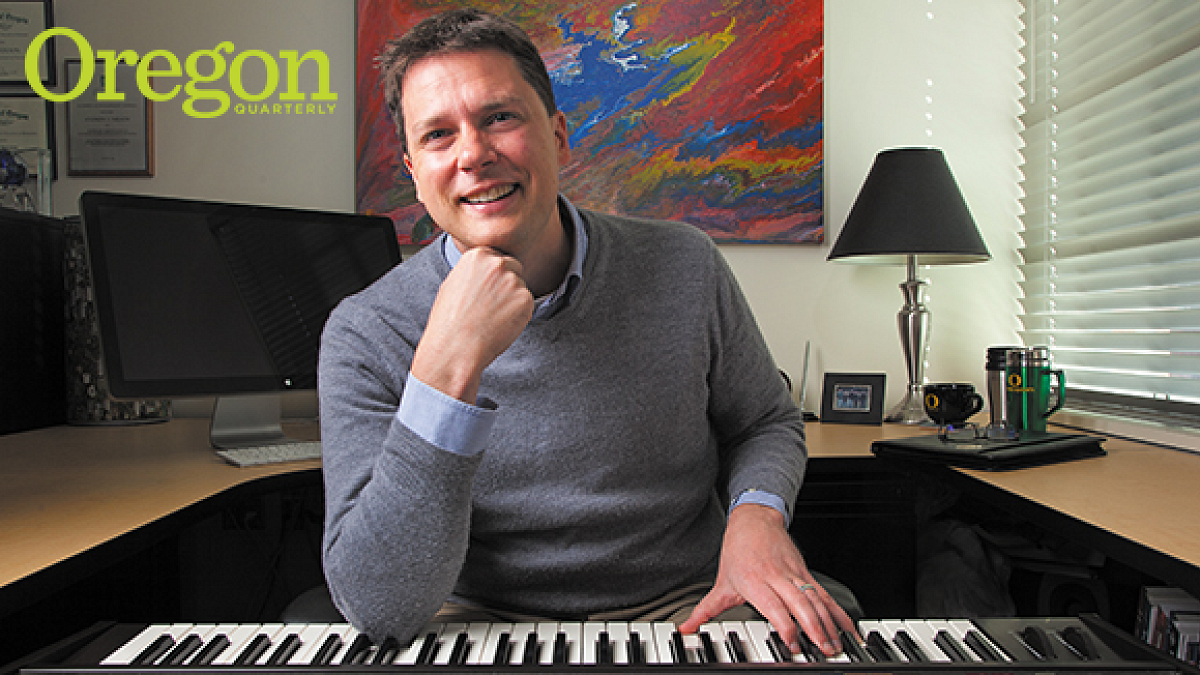MIXING IT UP
Andrew Nelson offers a disclaimer to his new MBA students: none of his academic credentials are in business. Instead, his diverse degrees in science, technology, music, economics, engineering, and social history inform his interdisciplinary teaching philosophy.
Nelson applies those same interdisciplinary principles to his positions as academic director for the Lundquist Center for Entrepreneurship and executive director of Eugene-Springfield’s Regional Accelerator and Innovation Network. In his view, entrepreneurship includes identifying social or environmental problems and finding creative solutions, and is most effective when elements of business, science, or engineering are blended with humanistic and social science. “You can’t just build a piece of technology without thinking how it’s going to be used or who is going to use it,” he says.
When chemists at the UO needed the perspective of a social scientist to help them understand the new field of sustainable chemistry, Nelson collaborated with them on an award-winning paper.
Likewise, drawing from his music background, Nelson is currently exploring the resurgence of vinyl records and 1970s synthesizers among millennials. The “fallacy of substitution” is that although records were replaced by MP3s, digital technology can’t replace the tactile experience. “The secondary factors—the feel of the record, reading the liner notes, or going into a record store—are not at all substituted. People are recognizing that, wait a minute, there’s something to that experience.”
AGREE TO DISAGREE
“When two partners always agree, one of them is not necessary” is a famous Dale Carnegie quote Nelson often shares with his students to break them of the idea that there’s only one right answer. “Nothing can be further from the truth for a lot of the complicated issues we wrestle with,” he says, “but the point of it is to hear different perspectives and to not necessarily arrive at agreement, but arrive at understanding.”
BACH IN TIME
According to Nelson, who is trained as a classical organist, the pipe organ was the most technologically advanced creation of its time. He once traveled all the way to Cappel, a tiny town in the very northern part of Germany, to play an organ from Johann Sebastian Bach’s Baroque period. “I spent three weeks there just to play music.”
$5 RED HOT CHILI PEPPER
In his entrepreneurship classes, Nelson encourages students to act creatively by giving teams five dollars to turn into more “value.” One innovative team purchased a hot chili pepper, auctioned off the rights to force one team member to eat it, and gave the proceeds to Food for Lane County. The result: a $271 donation and a lesson in finding opportunities in common resources.
BURGERS VERSUS BOOKS
Feeling overwhelmed in a new environment and lacking a clear direction, Nelson dropped out of Stanford University his sophomore year and returned to his small hometown in Montana, where he spent a year working at a local McDonald's. “It was a humbling experience, but it made me realize I wanted to get back into school.”
THE SOUNDS OF INNOVATION
In his book The Sound of Innovation: Stanford and the Computer Music Revolution, Nelson traces the beginnings of the innovative work of a group of renegade musicians and computer engineers at Stanford who came together to create digital music in the 1960s, laying the groundwork for today’s digital music and media libraries as well as music services such as Spotify and Pandora.


